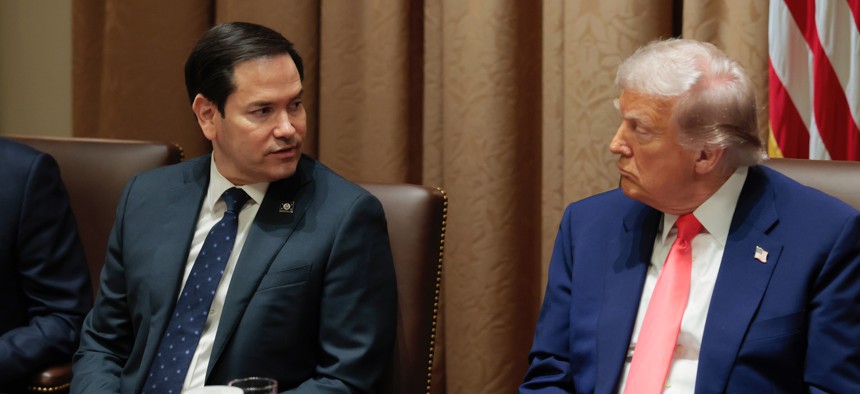
Secretary of State Marco Rubio speaks alongside President Donald Trump during a cabinet meeting at the White House on April 10, 2025. Anna Moneymaker / Getty Images
State to slash 15% of domestic staff, eliminate 132 offices
Layoffs expected by July 1, though embassy and overseas closures are not yet part of the plan
Updated April 22 at 3:52 p.m.
The State Department will eliminate 15% of its domestic staff as part of a reorganization of the entire agency, which will usher in the closure of 132 offices.
Impacted employees will receive reduction-in-force notices by July 1, the department told employees on Tuesday. State will go from 734 offices and bureaus to 602, while another 137 offices will be relocated within the department. A 15% cut to domestic staff will result in more than 2,000 employees losing their jobs. State told employees it is "actively exploring" voluntary retirement incentives and will have more information on them soon.
State Secretary Marco Rubio announced the reorganization to staff Tuesday, as employees had anticipated. He designated Deputy Secretary for Management and Resources-designate Michael Rigas—who served as President Trump’s Office of Personnel Management acting director in his first term—to lead the overhaul once he is confirmed by the Senate. Rubio said the eliminated offices are not mandated by law, do not align with Trump's priorities, have overlapping functions or "represent radical causes."
The secretary acknowledged that "change is difficult" and said he would welcome employee feedback through a new portal.
“Our people are our strength, but all too often the bureaucracy hamstrings our ability to advance America's core national interests,” Rubio said. “I want to empower our talented workforce to do their jobs as efficiently and effectively as possible.”
State employees in the civil service subject to RIFs, or layoffs, will likely be separated from the department at the end of their required notice period of either 60 or 90 days, the department told employees. Foreign Service officers will either be separated or, in some cases, receive reassignments. Contract employees will be terminated within 60 days.
FSOs may have to rebid for new roles if their current positions are eliminated.
Each undersecretary at State is currently finalizing a workforce plan and, once approved, will communicate specific impacts to staff. That will impact employees at both eliminated and relocated offices. Some employees will be reassigned, while others will be laid off.
All hiring decisions going forward will be concentrated into the newly renamed Bureau of Personnel, which will also oversee the Foreign Service Institute.
The changes will, for now, only impact domestic offices. State told employees it has not yet made any decisions on embassy, consulate or overseas post closures. The reorganization similarly does not include ongoing efforts to integrate the remains of the U.S. Agency for International Development into State.
The most significant changes will occur within the office of the Undersecretary for Civilian Security, Democracy, and Human Rights, which will now become the Office of Foreign Assistance and Human Rights. Many of the existing entities within that office, such as the Office of Global Criminal Justice, Office to Monitor and Combat Trafficking in Persons and the Bureau of Conflict and Stabilization Operations, do not appear to have a place in State’s new organizational chart. Those offices helped set U.S. policy for preventing and responding to mass atrocities, fighting human trafficking and negotiating ends to wars overseas.
Other offices set for elimination include the Office of Global Women's Issues, Energy Resources Bureau and the Office of Global Partnerships, which works with the American private sector to advance U.S. interests abroad. Energy Resources will fold into Economic and Business Affairs to ensure "a laser-like focus on expanding and exporting American energy." The department said it would offer more responsibilities and power to regional bureaus, which will also oversee non-security assistance.
State Deputy Secretary Christopher Landau stressed in a message to employees obtained by Government Executive that there will not be any disruption to “ongoing programming.” Going forward, Landau said, State will “align its activities and programs with the foreign policy priorities of the president and the secretary.”
The reorganization did not include some of the more radical changes to the nature of the Foreign Service as was previously part of a draft executive order to remake State. One Foreign Service officer said the plan moved a lot of pieces around, but outside of the democracy and human rights division, most of the changes were not earth-shattering.
"I wouldn't call these sweeping reforms...yet," the employee said, adding more problems could arise if more offices are gutted.
Sen. Brian Schatz, D-Hawaii, the top Democratic appropriator for State, suggested Rubio is presiding over "the continued weakening" of the department and its core functions. The changes are "in defiance of the law and at the cost of the American interests and values," the senator said.
"We need to hear from him directly and in detail about how he intends carry out the missions of the State Department amid severe cuts to its capabilities," Schatz said. "The consequences of gutting vital components of American influence are too great."
This story has been updated with additional detail.
How are these changes affecting you? Share your experience with us:
Eric Katz: ekatz@govexec.com, Signal: erickatz.28
NEXT STORY: There’s no more DEI at DOD, watchdog finds







